GALLUP NEWS SERVICE
Employee confidence declined for the fourth straight month in August, according to the Employee Outlook Index -- a joint effort of UBS and The Gallup Organization. But few employees blame poor business conditions at their companies on the lingering effects of Sept. 11. One out of three employees (33%) of private-sector for-profit companies say business at their company got worse following the events of last September, while 16% say it got better. About one out of four employees (23%) say their company's business is currently worse than it was prior to Sept. 11, but 35% say it is better. And even among employees who say their company's business is worse now, most say it has to do with the weak economy, not the lingering effects of the terrorist attacks.
The continued decline in employee confidence is another confirmation of the general decline in public sentiment toward the economy. Gallup is seeing similar trends in much of its other attitudinal economic data. Consumer assessments of the economy are now below where they were last September. Investor optimism has stabilized, but remains near its six-year lows. Overall, the attitudinal data show economic perceptions are now just as low or perhaps even lower than they were just prior to Sept. 11.
Given the deterioration in public perceptions of the economy, it is not surprising that many major retailers are reporting weaker than expected back-to-school sales -- a time of great importance to retailers that is second only to the Christmas selling season. On the other hand, it is also clear that a lack of employee/consumer/investor optimism about the economy has not deterred consumers from taking advantage of today's low interest rates and auto dealer sales incentives to buy such big-ticket items as cars and homes.
When housing and autos are doing well, the overall "hard" economic data are also going to show the economy performing fairly well. The key question for the future is whether consumers can continue to ignore their negative perceptions of the overall economy and their lack of income growth. Will they continue to make large discretionary purchases and thereby pump up an otherwise faltering economy? At this point, it is not clear that even consumers themselves can answer this question.
Employee Outlook Index Declines
The Gallup/UBS Employee Outlook Index is now at 58 -- down from 61 in July. It has declined for four straight months since its April benchmark was established at 72. Over this period, employees have also given their companies' current financial conditions progressively lower ratings, with the Present Company Conditions dimension of the Index declining steadily from 89 in April to 74 in August. Similarly, employees' expectations for the future financial conditions of their companies have consistently decreased, as the Future Company Conditions dimension of the Index has dropped from 74 in April to 60 in August. Finally, the Job Security dimension of the Index has also declined, moving from 52 to 41 over the same period.
| Gallup/UBS Employee Outlook Index |
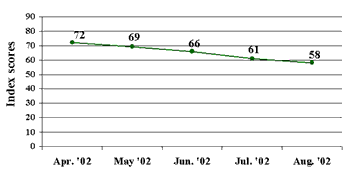 |
Sept. 11 Did Impact Business
Almost half of all private-sector employees at for-profit companies say Sept. 11 did affect the business of the companies where they work. Nine percent say the events of last September made their company's business much worse and another 24% say a little worse. At the same time, 16% say Sept. 11 made business a little better (12%) or much better (4%). On the other hand, 48% of employees say the events of last September had no impact on their company's business.
| How did the events of Sept. 11 affect the business of the company you work for? Did the business in your company – get much better, get a little better, stay about the same, get a little worse, or get much worse? |
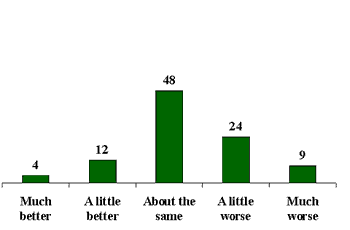 |
| August 2002 |
Negative Impact Has Not Lingered
More employees say their company's business is better now than say it is worse now than it was prior to Sept. 11. Ten percent say their company's business is much better and another 25% say it is a little better now than it was prior to the events of last September. At the same time, 23% say business is now a little worse (17%) or much worse (6%). Forty-one percent say their company's business is about the same.
| Compared to how well your business was doing prior to Sept. 11th of last year, would you say your company's business today is – much better than it was last year, a little better, about the.same, a little worse, or much worse than it was last year? |
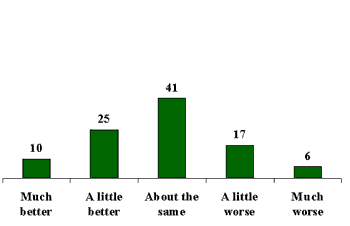 |
| August 2002 |
Importantly, three out of four employees who say their company's business is now worse than it was before September of last year attribute the decline to the state of the economy. Only 14% blame the weakness of business at their company on the terrorist attacks and only 10% say a combination of these factors, or other factors, have caused the decline.
Consumers See a Weak Economy
According to the latest Gallup poll (Aug. 19-21), a larger percentage of American consumers now rate current economic conditions as poor (28%) than rate them as either excellent or good (24%) -- the first time this has happened since April 1994. The percentage of consumers rating current economic conditions as excellent or good is now substantially below where it was just prior to Sept. 11 (32%). Like employee confidence, consumer ratings of the current economy are down from their April 2002 levels (39% good/excellent in the April 22-24 poll.).
| Rating of Current Economic Conditions |
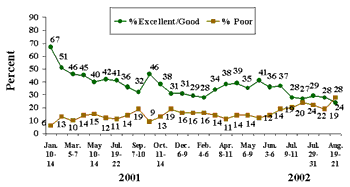 |
Investor Optimism Also Reflects a Weak Economy
The Gallup/UBS Index of Investor Optimism is at 52 in August -- up from 46 in July. Still, it is virtually unchanged from last September's reading of 50. And like employee confidence, it is down substantially from its April level of 89.
| Index of Investor Optimism – U.S. October 1996 to August 2002 |
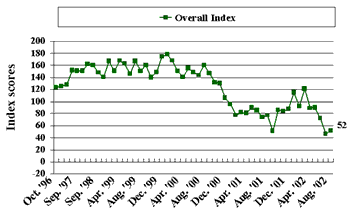 |
Survey Methods
Employee Outlook Index results are based on telephone interviews with -- 559 -- adults who are employed with non-governmental, for-profit companies having five or more employees, aged 18+, conducted Aug. 5-8, 2002 and Aug. 19-21, 2002. For results based on the total sample, one can say with 95% confidence that the maximum margin of sampling error is ±5 percentage points.
Economic conditions ratings are based on telephone interviews with -- 801 -- national adults, aged 18+, conducted Aug. 19-21, 2002. For results based on the total sample of national adults, one can say with 95% confidence that the maximum margin of sampling error is ±4 percentage points.
Index of Investor Optimism results are based on telephone interviews with 1,012 investors, aged 18+, conducted Aug. 1 – 15, 2002. For results based on the total sample of investors, one can say with 95% confidence that the margin of sampling error is ±3 percentage points.
